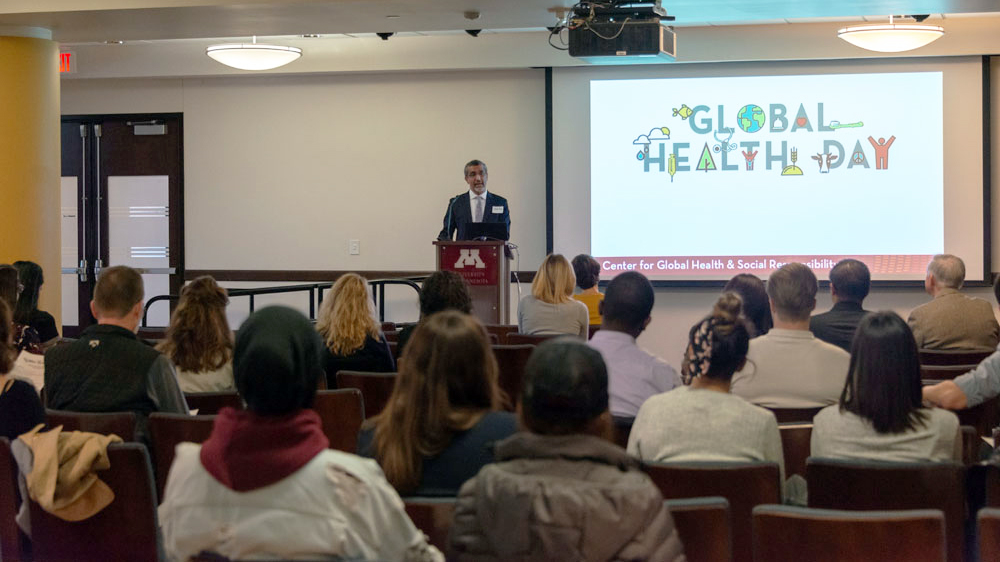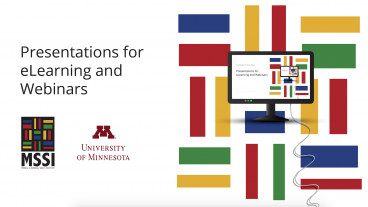
CGHSR director Shailey Prasad, MD, MPH speaking at Global Health Day, 2019.
Photo credit: Seth Dahlseid
In the era of COVID-19, it is clear that fields within the health sciences are inextricably linked. Collaborations between disciplines are more important than ever to connect public health to the health of animals and the environment—and to do so responsibly. It is in this role that the Center for Global Health and Social Responsibility (CGHSR) has been so successful for the past decade.
For ten years, CGHSR has served as a connector across the health sciences at the University of Minnesota. Where traditional university departments may tend to work in silos, CGHSR is able to cut across disciplines, bridging faculty in one field to researchers in another.
With similarities in mission, a partnership between CGHSR and the Center for Animal Health and Food Safety (CAHFS) has been a natural fit in recent years. Dubbed “sister centers,” CAHFS and CGHSR have worked together to synergize their activities and build an interdisciplinary network, bringing a global health lens to veterinary medicine, and animal health expertise to the wider University.
“There is a tendency sometimes for us to neglect aspects of animal health in our conversations about global health,” says Shailey Prasad, MD, MPH, executive director of CGHSR. “But animal health is a huge part of the overall health of communities, the overall health of individuals. And we have found CAHFS to be a willing and able partner in our work.”
The CGHSR vision notes that there is no such thing as borders around health, and the center’s programs and partnerships work within a framework of sustainability and equity to advance health world-wide. Programs such as global health seed grants, faculty travel awards, and the yearly Global Health Day event are ways that the center moves that vision forward.
CAHFS has historically collaborated with CGHSR in a number of these initiatives, such as participation in their Fogarty Fellows Program—12-month fellowship opportunities for awardees to conduct global health research. A number of CAHFS residents and researchers have been hosted by the program. In addition, both centers have shared management of the Consortium on One Medicine One Science (COMOS), an interdisciplinary collective of institutions, citizens, scholars, and policy-makers working at the human-animal-environment interface on research, policy, and training.
Over the last year, the partnership between CAHFS and CGHSR has been all about adaptability, as the two centers have worked together to modify and update projects in response to COVID-19-related challenges.
In October, the CAHFS eLearning team supported CGHSR in the annual U of M event Mini Medical School by creating a complementary online course for this year’s series: A Focus on Global Health. And earlier in the year, the team joined with CGHSR and the Medical and Surgical Skills Institute (MSSI) in Ghana to share effective practices when converting existing courses to online platforms and developing new COVID-19 and primary care courses. With the collaboration with the U of M, MSSI has been able to conduct 20 online trainings and reach more than 5,000 medical professionals across West Africa.
“I feel that it was the perfect opportunity where we were respectful of the need, and provided the technical solution for their work,” says Prasad. “It was a great partnership opportunity where we are not imposing our will, which is a huge part of our ethos—doing this collaboration in a socially responsible way.”
And with continued responsible partnership and sustainable programs, the next ten years at the center look to be just as successful.
See all stories in the November 2020 issue of the CAHFS One to One newsletter

